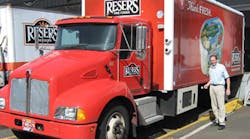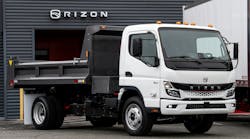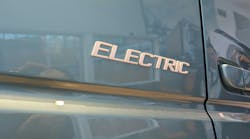To become a major force in the world of food transport requires careful attention to detail, particularly as it relates to transporting those finished products to their final destination. Make those products temperature-sensitive salads, side dishes, dips, Mexican foods, and other specialty products, and that adds yet another layer of complexity.
But Beaverton, OR-based Reser’s Fine Foods has found solutions through the use of electricity and cold-plate refrigeration technology.
“We are a SmartWay compliant company and strive to support the SmartWay goals,” says Dennis Fullan, corporate fleet manager, adding that in following SmartWay best practices, the No. 1 goal remains the integrity of the cold-chain. “I would like to see more electrification as it would expand our universe.”
But for now, Reser’s is content with using cold-plate technology across its 140-vehicle direct store delivery (DSD) fleet to maintain temperature control. Reser’s uses a system from Johnson Refrigerated Truck Bodies.
The all-electric Johnson system operates much like an ice pack in a picnic cooler. Plug it in and the liquid inside the plates freezes, holding the temperature inside the truck body for up to 24 hours, depending on ambient temperatures. Most of the Reser’s fleet was converted from diesel-fired units to the electric Johnson system, Fullan says.
“We were introduced to the coldplate technology when we purchased several used trucks so equipped,” Fullan says. “It became apparent rather quickly how much more efficient the cold plates were—more efficient in terms of maintenance, more efficient with respect to operating cost, and more efficient from an environmental perspective.”
NO IDLING ALLOWED
Fullan says the cost to operate the entire fleet for a year is now equivalent to what Reser’s was spending to run 10 of the diesel-fired units before, including maintenance and fuel costs. And it ensures the company can meet its noidling policy while maintaining the necessary temperatures inside the van bodies.
With over $700 million in annual revenue, the fourth-generation, familyowned business operates a dozen manufacturing facilities in seven states, creating a vast network of locations needed to deliver product in all 50 states and Canada. While switching to the coldplate technology provided immediate benefits, there was still the issue of the DSD vehicles reaching the distribution centers and warehouses, sometimes resulting in unnecessary miles driven.
Many of the DSD routes involve an overnight stay, Fullan says. To combat that, Reser’s is building its own network of recharging locations, installing some systems at drivers’ homes and other locations closer to their routes to cut driving time and improve efficiency. The company says that by providing more localized sites for distribution trucks to plug in, it has cut the number of unnecessary trips to centralized distribution points from daily to once or twice a week in some cases.
“It would be nice to plug in at intervals,” Fullan says. “We plug in to recharge every day. We look for layover locations that have three-phase power so we can recharge en route but these facilities are rare.”
Shorepower Technologies is helping to fix that by embarking on a federally funded program to install plug-in systems at 50 truck stops along major freight corridors by the end of this year. Many of the sites will have highervoltage connections available to plug in trailer refrigeration and cold-plate systems.
“Building this network of plug-in sites is vital not just for reducing idling while keeping drivers comfortable but for providing a cost-effective way of protecting temperature-sensitive shipments,” says Alan Bates, vice president of marketing with Shorepower Technologies. “This is a critical issue in a time of rising fuel prices. By providing low-cost grid power as a replacement for diesel fuel, we can help companies like Reser’s not only hold the line on costs but costeffectively reach new markets.”
Reser’s also employs idle-reduction equipment on its over-the-road longhaul fleet, some 130 vehicles. Thermo King refrigeration units and auxiliary power units (APUs) for heating, cooling, and power were installed. According to Fullan, the payback calculated at the time on the APUs was 18 months based on a diesel-fuel cost of $2.50/ gal. Use of the APUs also has helped to eliminate an average of 11 hours of idling per day per truck. For Reser’s, that is a cool way to run green.



